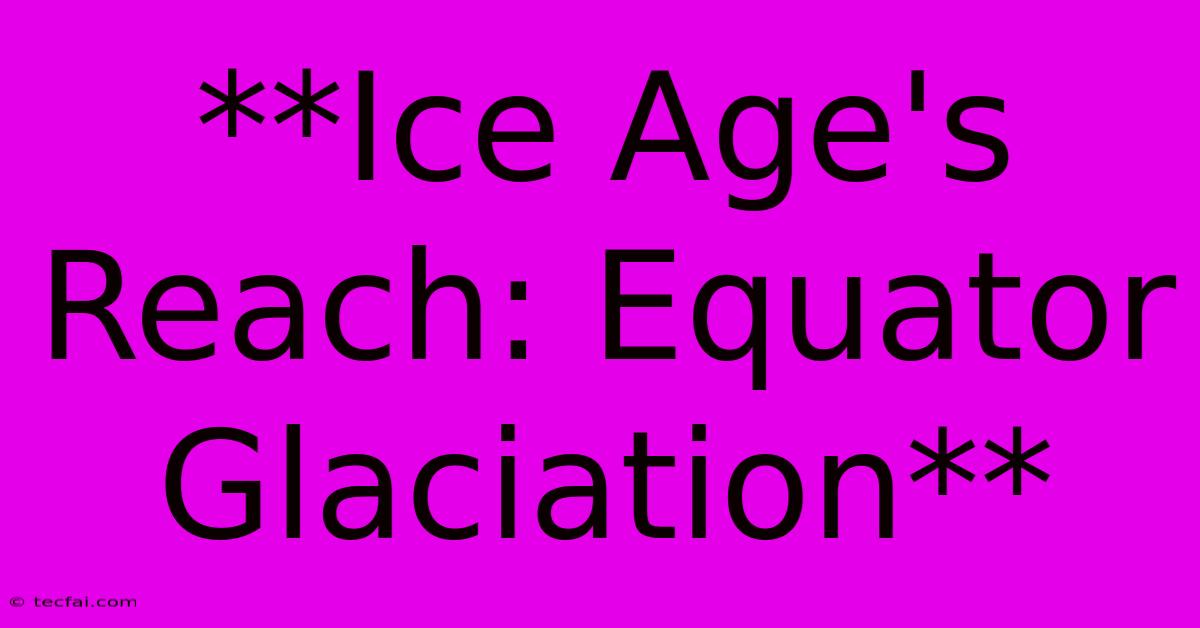**Ice Age's Reach: Equator Glaciation**

Discover more detailed and exciting information on our website. Click the link below to start your adventure: Visit Best Website tecfai.com. Don't miss out!
Table of Contents
Ice Age's Reach: Equator Glaciation
The Earth's history is a tale of dramatic shifts, and among the most fascinating is the story of glaciation. While we typically envision ice sheets covering polar regions, a lesser-known phenomenon is equatorial glaciation, where ice sheets have even extended towards the tropics. This intriguing event, a testament to Earth's dynamic climate history, offers valuable insights into the complex interplay of geological forces and their impact on our planet.
A Deep Dive into Equatorial Glaciation
Equatorial glaciation is a rare occurrence, documented primarily during the Paleoproterozoic Era (2.5 to 1.6 billion years ago) and the Cryogenian Period (720 to 635 million years ago). These periods, known for their extreme cold, saw vast ice sheets engulfing the Earth's equatorial regions, fundamentally reshaping the planet's landscape and influencing the evolution of life.
What triggered these massive glaciations?
The causes of equatorial glaciation remain a subject of intense scientific debate, with several theories vying for prominence. Some leading hypotheses include:
- Reduced Atmospheric Carbon Dioxide: A significant decrease in atmospheric CO2 levels, a potent greenhouse gas, could have cooled the Earth's surface, leading to widespread glaciation.
- Volcanic Activity: Massive volcanic eruptions releasing sulfur dioxide into the atmosphere can reflect sunlight, causing a cooling effect and triggering ice ages.
- Changes in Earth's Orbit: Variations in Earth's orbit, known as Milankovitch cycles, can influence the amount of solar radiation reaching different parts of the planet, potentially triggering glacial periods.
- Supercontinent Formation: The formation of supercontinents can lead to changes in ocean circulation patterns, potentially affecting global climate and promoting ice sheet growth.
The Impact of Equatorial Glaciation
Equatorial glaciation had profound consequences for the Earth's environment and the evolution of life. Some of the key impacts include:
- Sea Level Drop: As vast quantities of water became locked in ice sheets, global sea levels dropped drastically, exposing vast areas of land.
- Ocean Circulation Changes: Glaciation dramatically altered ocean currents, impacting nutrient distribution and potentially leading to ocean anoxia (lack of oxygen).
- Biosphere Stress: The extreme cold and harsh conditions of equatorial glaciation exerted enormous pressure on lifeforms, likely leading to mass extinctions and adaptive evolution.
Unraveling the Mystery
Despite the advancements in scientific understanding, much remains unknown about equatorial glaciation. Ongoing research focuses on:
- Reconstructing Past Climates: Scientists use various geological tools like ice cores, sediment analysis, and geological dating to reconstruct past climates and understand the extent and duration of equatorial glaciation.
- Simulating Climate Models: Sophisticated computer models are employed to simulate the effects of different factors on global climate, helping to test various hypotheses about the causes of equatorial glaciation.
- Investigating the Impact on Life: Studying fossils and analyzing geological evidence from the periods of equatorial glaciation helps scientists understand how life adapted to and survived these extreme conditions.
The study of equatorial glaciation provides a glimpse into Earth's ancient past, revealing a planet vastly different from today. By understanding these past events, we gain crucial insights into the complex interactions between geological forces, climate dynamics, and life on Earth. This knowledge is vital for predicting future climate change and ensuring the sustainability of our planet.

Thank you for visiting our website wich cover about **Ice Age's Reach: Equator Glaciation**. We hope the information provided has been useful to you. Feel free to contact us if you have any questions or need further assistance. See you next time and dont miss to bookmark.
Featured Posts
-
Sara Sharif Father Takes Blame For Daughters Death
Nov 14, 2024
-
Everton Araujo Upcoming Matches And News
Nov 14, 2024
-
Sump Truck Flips Evacuates Wellington Homes
Nov 14, 2024
-
Dogecoin Price Elon Musks New Role
Nov 14, 2024
-
Timothy West Dies East Enders And Coronation Street Star
Nov 14, 2024
